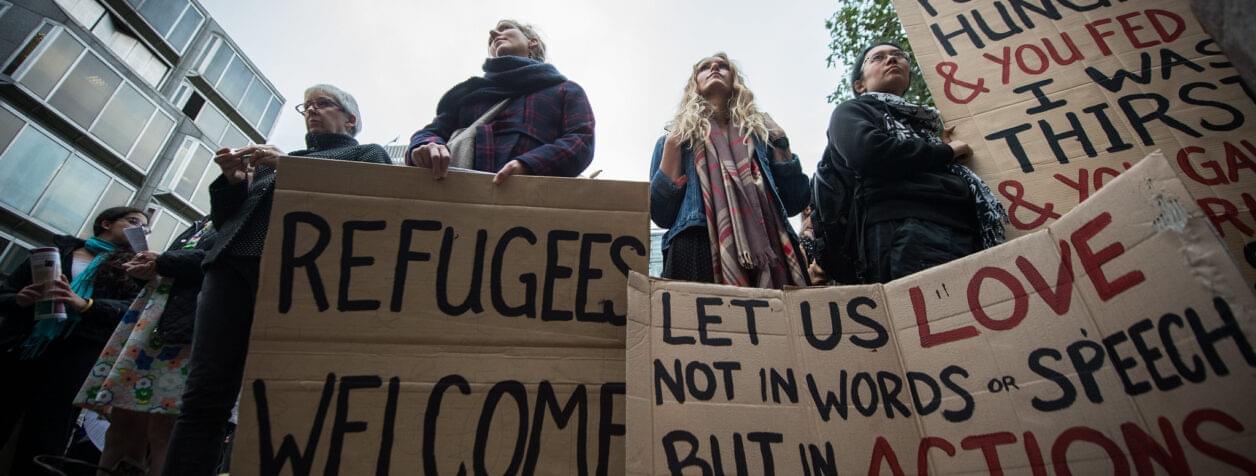The émigré Holy Family of Nazareth, fleeing into Egypt, is the archetype of every refugee family. Jesus, Mary and Joseph, living in exile in Egypt to escape the fury of an evil king, are, for all times and all places, the models and protectors of every migrant, alien and refugee of whatever kind who, whether compelled by fear of persecution or by want, is forced to leave his native and, his beloved parents and relatives, his close friends, and to seek a foreign soil.
Exsul Familia [1], Pius XII
When talking about Channel crossings, refugees, and people seeking asylum in the UK, most people (including the media), tend to refer to ‘safe countries’ and question why refugees do not seek asylum in France, or other countries they pass through on their way to the UK.
Firstly, it is important to note that claiming asylum is a human right available to all and in doing so, there is no specification or determination as to which country you should claim asylum in, or at what point in your journey you should claim, nor how far you can travel to do so.
Most people fail to understand the reasons for flight, and the subsequent journey taken by refugees in search of sanctuary. Most refugees are not travelling to Europe, and they are not trying to reach the UK. The UK is home to approximately 1% of the millions of refugees forcibly displaced across the world[1], with the majority of refugees remain in the first country they arrive in, with 69% remaining in countries neighbouring their country of origin[2].
It is to be noted that these host countries may face difficulties which impact their ability to support refugees – such as conflict, economic instability and other domestic crises[3]. These are often some of the reasons refugees are compelled to travel onwards and seek refuge elsewhere. Additionally, not all countries have signed the Refugee Convention, which means should refugees remain there, they would not be afforded international protection and granted refuge or provided the necessary support.
With regards to European countries, Germany receives the most refugees (approximately a third of EU applications), whilst Spain, Italy and France also receive large numbers. Government statistics show that in 2024, the UK was below average among the EU countries for asylum applications[4]. Those who decide to travel onwards from France to reach the UK, are a very small proportion of those claiming asylum in Europe[5].
Seeking asylum in the UK
Many believe refugees choose to come to the UK because of the level of support available, but research has proven these beliefs wrongs as most people are unaware of asylum processes and the level of Government support provided. Rather, their decisions are based on ‘the practicalities and demands of the situations that individuals face having fled their homes as refugees […] not aware of their eventual destination when they make the initial decision to migrate’[6]. Additionally, their experiences during flight will undoubtedly affect their decision-making and eventual route, such as the people they meet en-route and the community they build, or the treatment they receive, as well as possible exploitation by smugglers and agents who pretend to have their best interests at heart and offer to help them[7].
Those who specifically wish to claim asylum in the UK, often have a compelling reason to do so, often due to family ties or professional links to the country, but also due to language connections.
Language ability cannot be discounted when considering reasons for seeking asylum in the UK – having lost everything and then having to rebuild in a foreign country, even a basic knowledge of and familiarity with the local language can provide a great advantage in navigating new systems and contribute to a feeling of safety.
Reuniting with family and friends also contributes to a feeling of safety and support. When forced to flee, many families are often separated, and it is through the support of organisations such as the Red Cross that they are able to trace and reunite with family members[8]. Others will learn of family members living in the UK, be they distant relatives, but having lost their home and community and often times family members, they wish to be reunited with family and to regain a sense of belonging.
Additionally, when looking at people’s decision to seek asylum in the UK, we must consider Britain’s colonial legacy, during which it ruled a quarter of the globe, and which has left a lasting imprint on many regions of the world. It is refugees from these regions, forced to flee as a result of historical exploitation, arbitrary borders and imposed governance systems, that Britain receives and is host to. One clear example is the partition of India, Pakistan and Bangladesh as a direct result of British colonial policy, which created a legacy of displacement and continues to affect refugee flows – Government statistics show that ‘in 2024, 42% were nationals of Asian countries, with the largest individual Asian nationalities being Pakistani, Bangladeshi, and Indian’[9]. Afghans also make up a large percentage and that is due to the UK’s recent involvement in Afghanistan, which saw them employ many Afghan nationals to support the war-effort, all of whom then became targets for the Taliban upon withdrawal of allied forces from the country. The UK had a responsibility to support those individuals and their families, hence the introduction of the Afghan resettlement scheme. However, not all individuals have access to bespoke resettlement schemes and thus embark on dangerous journeys to reach the UK, as noted earlier in this guide.
Migrants Rights has published a piece looking at colonialism and imperialism as a root cause of displacement, from the ‘Scramble for Africa’ to the Balfour Declaration and destabilisation of the Middle East, and the invasion of Afghanistan[10], noting the connection between Western foreign policy interventions and forced displacement.
[1] https://www.refugeecouncil.org.uk/stay-informed/explainers/the-truth-about-asylum/
[2] https://www.unhcr.org/refugee-statistics
[3] https://www.rescue.org/uk/article/what-are-safe-routes-refugees-myths-vs-facts
[4] https://commonslibrary.parliament.uk/research-briefings/sn01403/
[5] https://www.rescue.org/uk/article/why-dont-refugees-stay-first-country-they-reach
[6] https://www.google.com/url?sa=t&source=web&rct=j&opi=89978449&url=https://www.refugeecouncil.org.uk/documents/47/Chance-or-choice-2010.pdf&ved=2ahUKEwiVy4Tjuv2NAxUwVkEAHSBEAFYQFnoECB4QAQ&usg=AOvVaw00_Wlm-fpC2_1PKd-3BXM0
[7] https://www.gov.uk/government/publications/asylum-seeker-decision-making-in-journeys-to-the-united-kingdom-2022/asylum-seeker-decision-making-in-journeys-to-the-united-kingdom-2022
[8] https://www.redcross.org.uk/stories/migration-and-displacement/refugees-and-asylum-seekers/the-family-reunited-in-a-global-pandemic
[9] https://commonslibrary.parliament.uk/research-briefings/sn01403/
[10] https://migrantsrights.org.uk/2024/06/19/colonialism-imperialism-cause-displacement-world-refugee-day/

